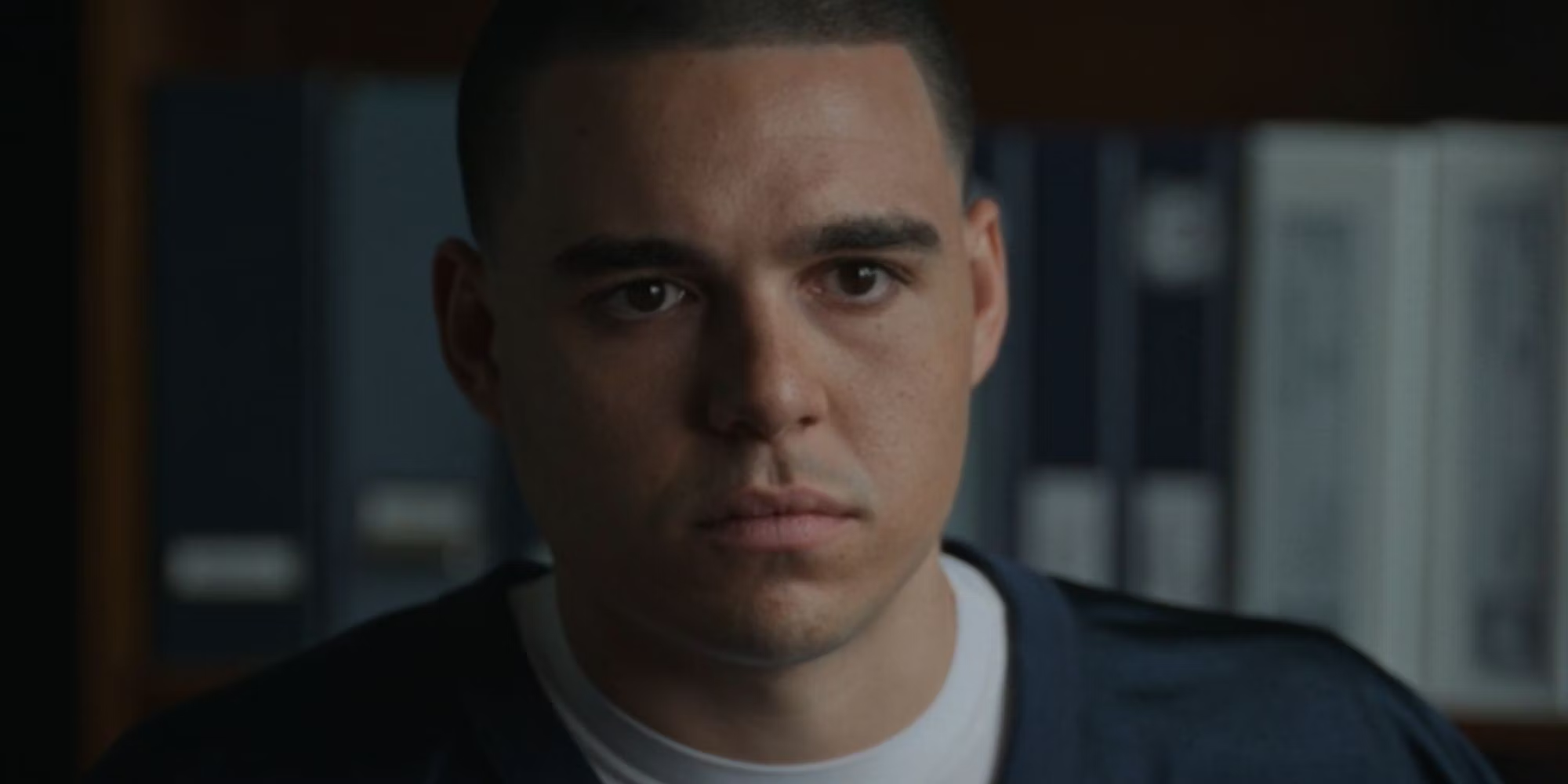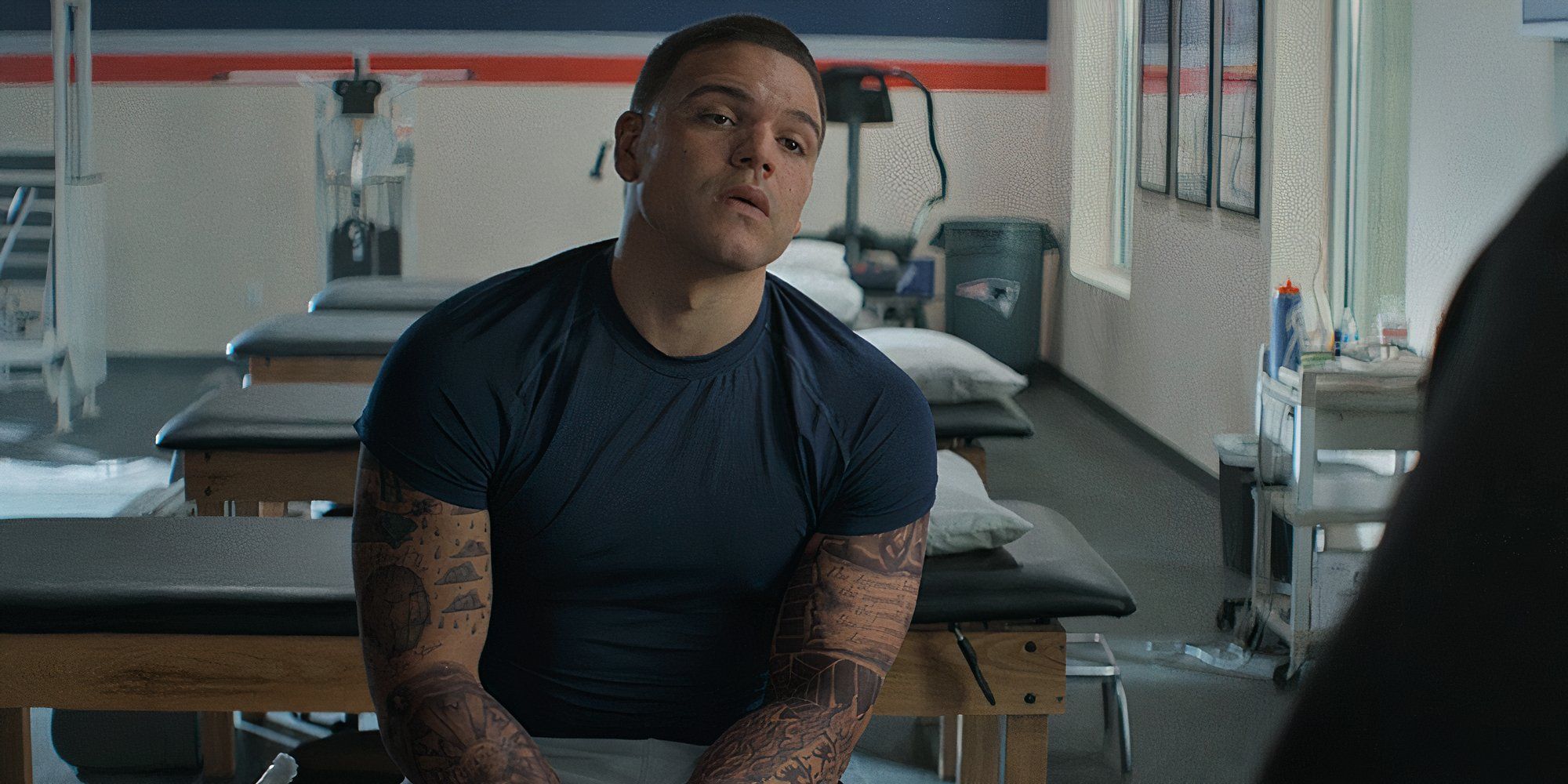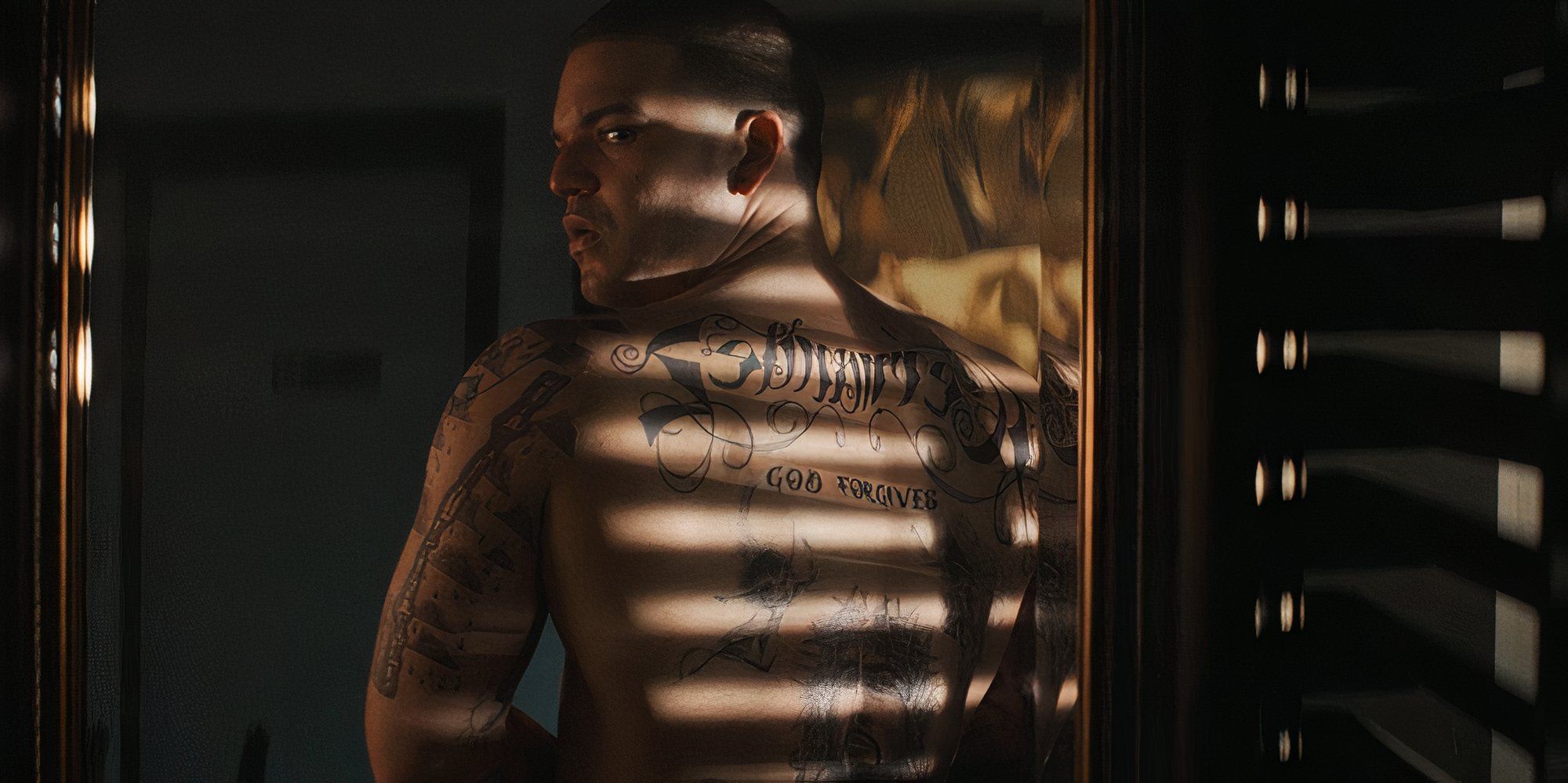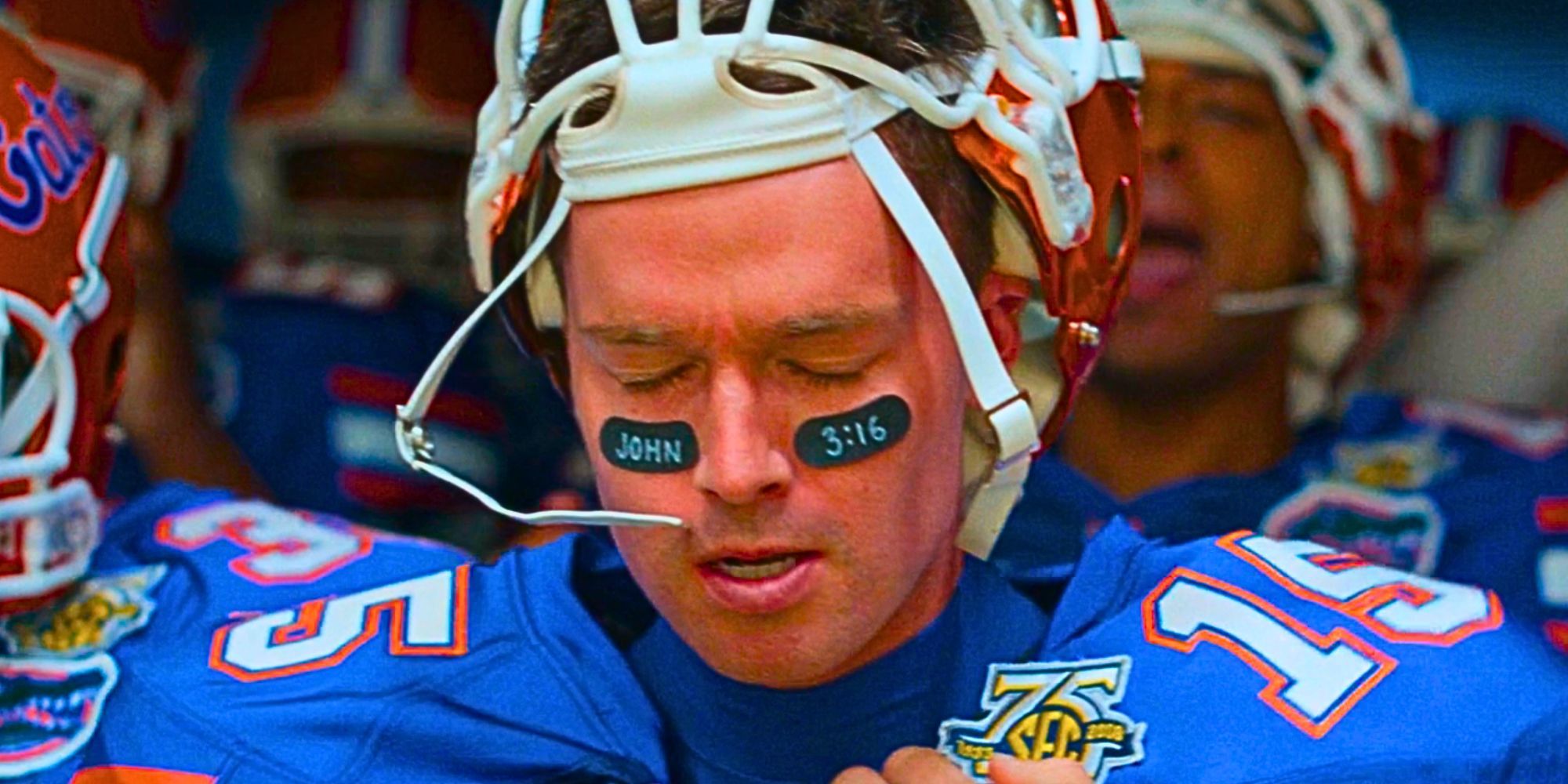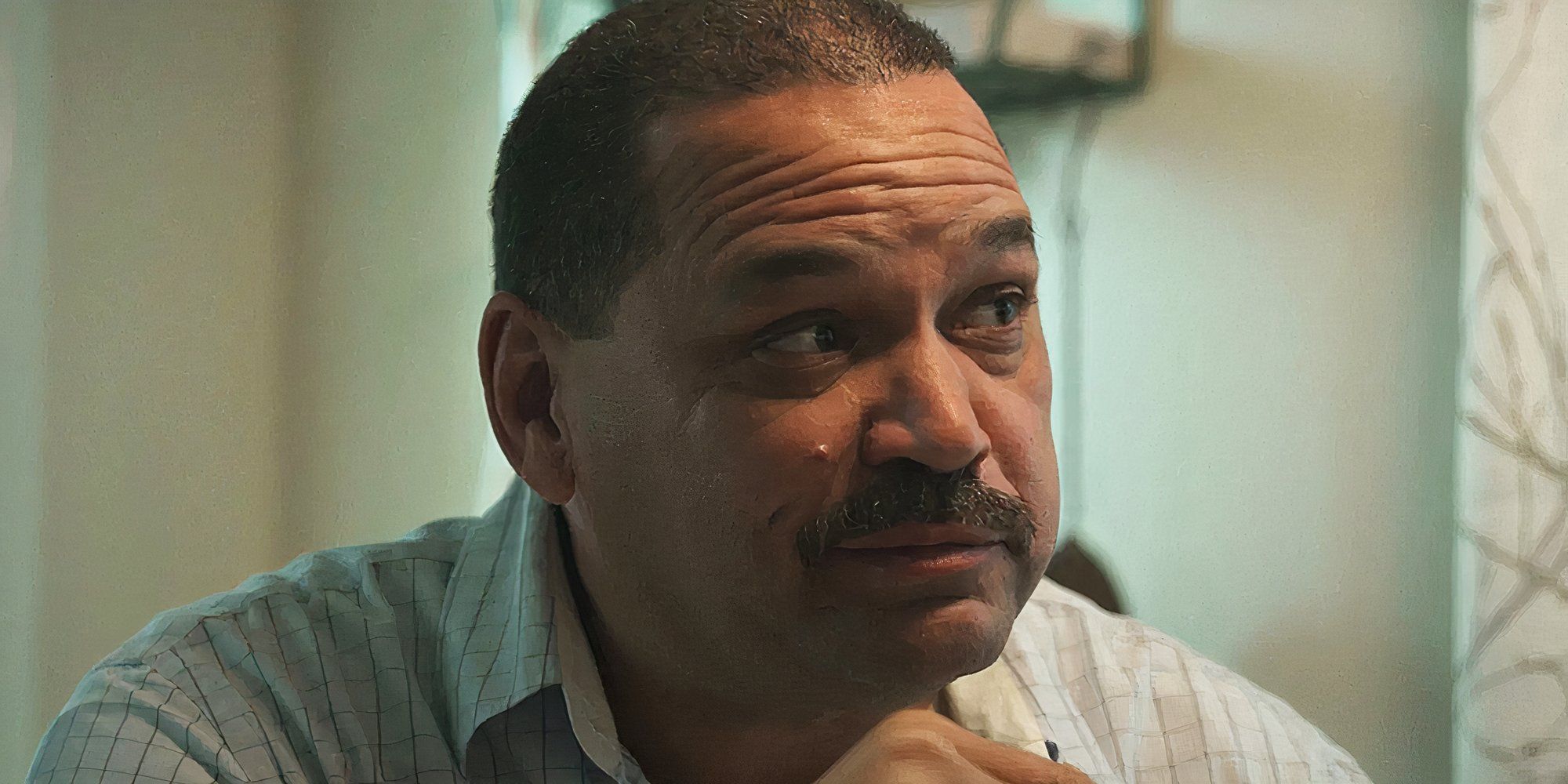American Sports Story Ending Explained & What The Finale Changed About Aaron Hernandez’s Fate
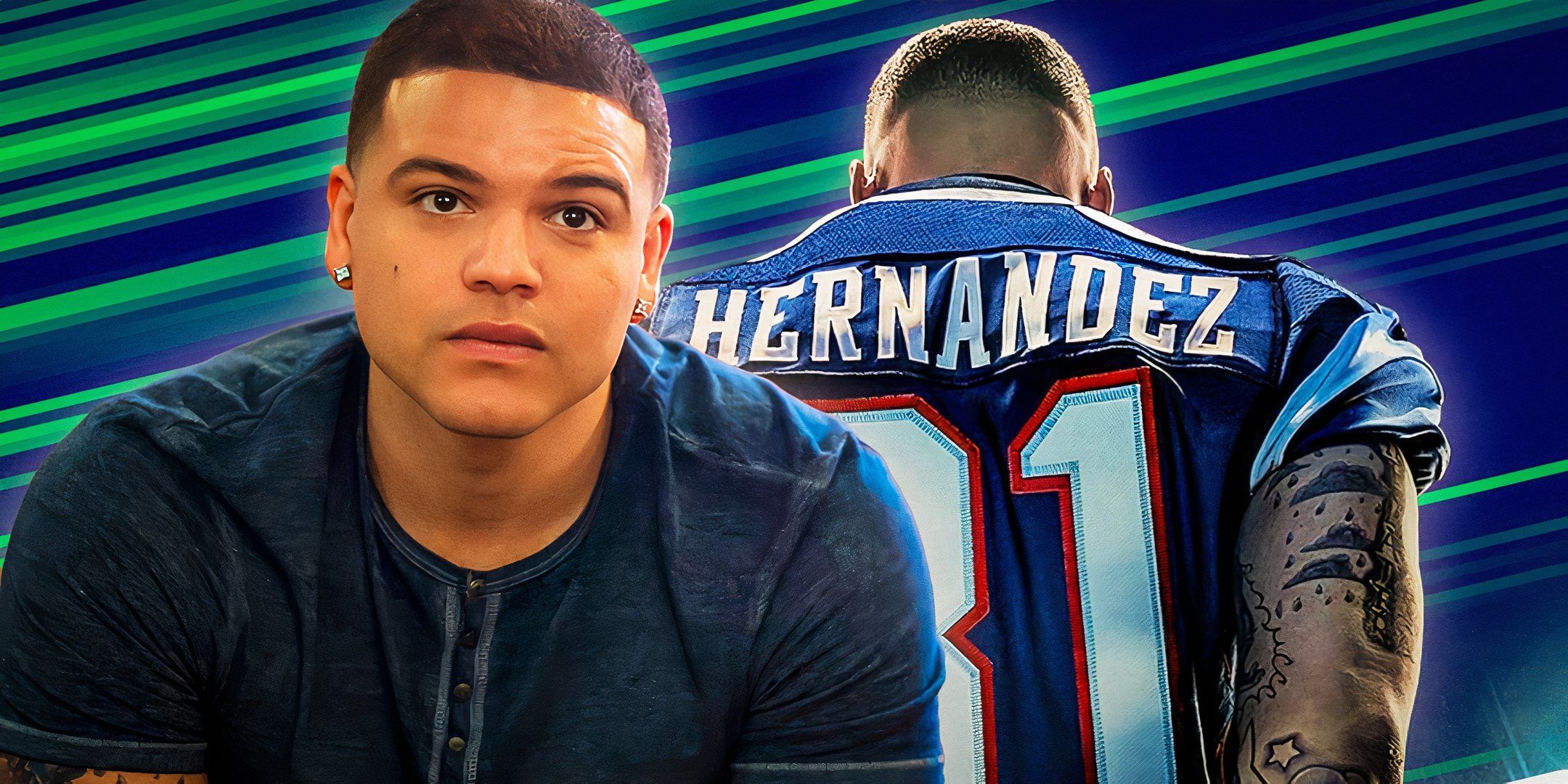
WARNING: SPOILERS ahead for the finale of American Sports Story.
The series finale of FX’s American Sports Story changed several true story aspects about the life and final days of Aaron Hernandez. Since the first two episodes of American Sports Story, the life and NFL career of Aaron Hernandez were headed toward a tragic and frightening endpoint that resulted in the former New England Patriot and star tight end receiving a lifetime prison sentence for the murder of Odin Lloyd. From his emergence as an offensive weapon on Urban Meyer’s legendary yet controversial Florida Gators team and receiving the coveted John Mackey Award, ASS episodes 9 and 10 depict Hernandez behind bars in federal prison.
American Sports Story episode 10 “Who Killed Aaron Hernandez?” chronicles Hernandez’s second murder trial and death by suicide in 2017. Episode 9 placed Hernandez’s ex-fiancee Shayanna Jenkins in the hot seat as she chooses to defend Hernandez through his arrest and murder conviction. The series also depicts Hernandez’s celebrity attorney Jose Baez and his defense through the alleged double homicide that occurred in 2012 in Boston. By the end of the American Sports Story finale, Hernandez takes his own life in his prison cell just days after being acquitted of two additional murder charges.
All 10 episodes of
American Sports Story: Aaron Hernandez
are now streaming on Hulu.
Sherrod Did Not Have An Emotional Outburst During His Testimony
Sherrod lost credibility with the jury because of a text he sent to his attorney
The American Sports Story: Aaron Hernandez finale depicts the return of Sherrod looking for vengeance against Hernandez for allegedly shooting his eye out. Although the series portrays Hernandez shooting Anthony “Sherrod” Bradley in the face, it was never proven that he did such a thing in real life. Bradley did, however, testify against Hernandez in the double homicide trial as the prosecution’s star witness. ASS episode 10 shows Sherrod having an emotional outburst at Hernandez, which satisfies Hernandez’s attorney, Jose Baez. In reality, Sherrod’s credibility was damaged because of a text he sent to his attorney that suggested he planned to lie under oath to frame Hernandez, which Baez revealed to the jury, a key detail that the show leaves out.
DJ Hernandez Said Aaron Told Their Mom About His Sexuality Before Suicide
ASS omits this crucial scene to frame Hernandez’s suicide as an act of shame
Another important true story detail that the ASS finale leaves out is Hernandez finally coming out to his mother, Terri, as gay. Aaron’s brother, DJ, who goes by Jonathan, revealed on T he Dr. Oz Show in 2020 that his brother had revealed the truth about his sexuality to their mother during a prison visit. “He’s like, ‘Mom, you’re going die never knowing your son,‘” Jonathan said (via Entertainment Weekly). “Then all of a sudden they have this conversation, and they’re both flooded with tears across from each other.” Interestingly, this crucial moment is not depicted or implied whatsoever in the series.
Chris Was Not Present At Hernandez’s Second Murder Trial – His Character Is Fictitious
Chris’s entire storyline was invented for the series
One of the most consistent true story changes in American Sports Story is the invention of Chris Taylor, one of Hernandez’s athletic trainers. The series features Chris in several episodes and depicts him as Hernandez’s secret hookup buddy who would accompany him on exotic getaways in Cabo. Chris is not based on an actual person, meaning that his presence in the courtroom in the ASS finale is completely fictitious. Jose Baez also never confronted Hernandez about the prosecution team discovering receipts for the Cabo vacation because it never happened.
American Sports Story Omits Hernandez’s Alleged Lover In Prison
Kyle Kennedy claimed that Hernandez told him about a fourth person he killed
Hernandez allegedly had sexual relations with his cellmate, Kyle Kennedy, while incarcerated at the Souza-Baranowski Correctional Center in Lancaster, Massachusetts (via People). The series only depicts one other notable inmate during Hernandez’s time in prison, who Hernandez gets into a physical altercation with. Kennedy also claims that Hernandez spoke of a fourth murder he committed that he was never caught for (via CBS Boston). Given that nobody has substantiated Kennedy’s claims, it makes sense why the series left him out. If it was established that Hernandez had a gay lover while in prison, the ending of the ASS finale wouldn’t make any sense, as Hernandez looked to escape from reality through synthetic cannabis after rumors spread about his gayness.
Why Hernandez Wrote John 3:16 On His Forehead & Wall
Tim Tebow used to write it on his eye black
The series portrays an accurate depiction of how corrections officers found Hernandez’s body. According to CNN, “The night of his death, Hernandez had placed a large amount of shampoo on the floor to his cell, making it very slippery, according to the investigation report.” However, while “John 3:16” was written on his prison wall in blood, it was written in ink on his forehead. “Underneath the drawings on the wall was a Bible open to John 3:16, with the 16th verse marked in blood, according to the report.” There were also no drugs found in Hernandez’s system at the time of his death, which contradicts the portrayal in the ASS finale.
John 3:16 reads, ”
For God so loved the world, that he gave his only begotten Son, that whoever believes in him should not perish, but have everlasting life
.”
Hernandez had reportedly found solace through religion during his time in prison. It is also accurately portrayed in the series that his former Florida Gator quarterback Tim Tebow had encouraged him to get more into religion while they were teammates. Tebow was known for writing “John 3:16” on his eye black during games. However, there’s no evidence to suggest that Hernandez was making a direct link or homage to him in this way.
What The Boston Sports Talk Radio Show Really Said About Hernandez
The general gist of what was said about Hernandez on the Boston radio show “Kirk & Callahan” was accurate. Boston-based sports reporter Michelle McPhee was a guest on the WEEI radio station and made insinuating comments about the potential motive behind the murder of Odin Lloyd. According to The New Yorker, “Using football metaphors to insinuate his preference, the men referred to Hernandez as a “tight end on and off the field,” adding, “then he became a wide receiver.” This went on, with McPhee adding that Hernandez kicked “with both feet.“” A motive for Lloyd’s murder was never determined.
After Hernandez’s death, McPhee stated, “What I said was really inelegant of me, and it’s not something I would have done if I wasn’t on a sports-radio show. It’s not a laughing matter, in any way, shape, or form. But I would certainly hope, in 2017, that Aaron Hernandez was more troubled by the fact that he killed his close friend, the boyfriend of his fiancée’s sister, than his sexuality.” The series implies that Hernandez and other inmates became aware of his sexuality through the radio show, which led to his suicide.
Hernandez’s Scene With His Father Dennis Explained
Hernadnez’s troubles started after the loss of his father
One of the final scenes in the American Sports Story finale portrays Aaron talking to his deceased dad, Dennis, which sets a foreshadowing tone of what’s to come. Dennis was a highly influential figure in Hernandez’s life but was also physically and emotionally abusive. Despite this, Aaron chooses not to blame his father for his terrible life choices during their phone call. Hernandez finally takes accountability and admits to himself that he lost his way on his long road of trying to make his father proud through football. Hernandez is high on synthetic cannabis during this scene, but the core message in their conversation highlights Hernandez coming to terms with the pain he has both felt and inflicted on others.
The Real Meaning Of American Sports Story’s Ending
Shayanna sees the good and bad sides of football in the final scene
In the final scene of American Sports Story, Shayanna looks at the kids playing football. She remembers Aaron, just a kid who loved a game, but also thinks of the dangers within the game that millions of kids love to watch and play. The series blatantly points the finger at the sport and institution of professional football for Hernandez’s choices, resting with the presumption that Aaron’s advanced stage 3 CTE diagnosis was the main reason for his behavioral instability and impulsive acts of violence. It also suggests causation on the part of the Boston sports talk radio show and reporter Michelle McPhee for outing his sexuality on air, which is based in fact but delivered with a heavy hand in the show.
While the timing of the radio show in proximity to Hernandez’s death is accurate, it’s unconfirmed whether it ever got around to Hernandez and if it influenced his decision to end his life. The series also arguably leans more into Hernandez’s sexuality and closeted gayness than evidence may suggest, resulting in a portrayal of Hernandez as a victim of various forces: physical abuse and toxic masculinity of his father, alleged sexual abuse from an unidentified person as a child, chronic cannabis consumption and various substance abuse, closeted gayness and repressed sexuality, lack of medical intervention by elite football programs leading to advanced and undiagnosed stage 3 CTE, etc.
American Sports Story covers many accurate bases while also inventing plot points and characters for the sake of entertainment. Ultimately, the series doesn’t add much factual clarity to Hernandez’s true story by replacing blank spaces with hyperbole, insinuations, and in some cases, unproven and false information. While the series attempts to connect the various true story dots that naturally make Hernandez’s case fascinating, it overextends its creative liberties by crafting new dots for dramatic effect in search of a nonexistent resolution. A more thoughtfully crafted series might have allowed viewers to arrive at their own conclusions rather than forcing fabricated and exaggerated ones to align with a creative vision.
Sources: Entertainment Weekly, People, CBS Boston, The New Yorker
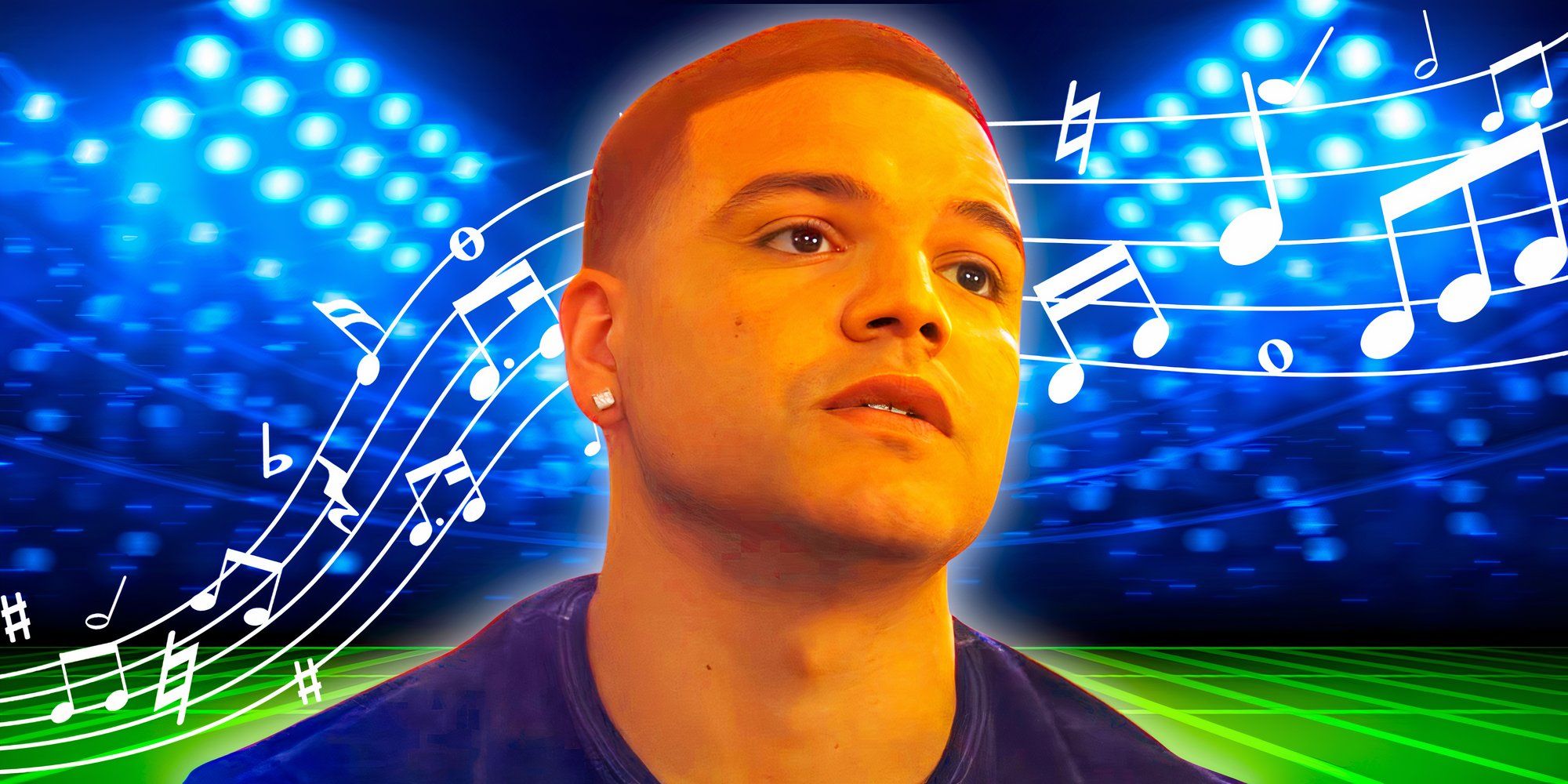
Related
American Sports Story Aaron Hernandez Soundtrack Guide: Every Song And When They Play
FX’s new series American Sports Story features a robust and relevant soundtrack full of 2000s hip-hop classics and collegiate fight songs.
Related
Here’s how Cadillac can become a true American F1 dream…
Credit: Instagram Cadillac (@cadillac) Cadillac F1 stands to have a huge chance to be an American team by and for Americans, something that Formula 1 so badly
Stephen A. Smith Contract Extension – Work Less, Earn More,…
Stephen A. Smith has just landed the contract of his life with ESPN!
American Athletic Conference becomes first league to set ‘minimum standard’…
The American Athletic Conference approved an initiative on Friday to establish a minimum standard of benefits that schools are required to share with athletes i
The NWSL is the first top American sports league to…
When NCAA All-American striker Diana Ordóñez debuted in the NWSL in 2022, there was little more that she could ask from her rookie season with the North Carol
